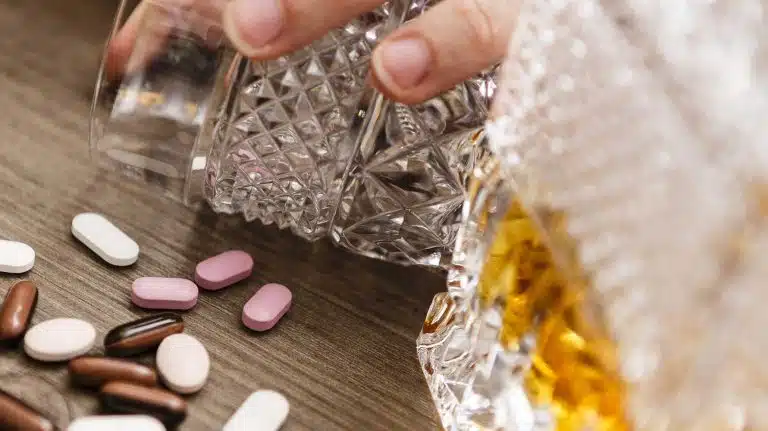Mixing Alcohol & Ambien | Effects & Health Risks
- Effects Of Mixing Alcohol & Ambien
- Health Risks Of Mixing Alcohol & Ambien
- Treatment For Alcohol & Ambien Abuse

Ambien and alcohol use are not a good mix. As central nervous system (CNS) depressants, they have similar effects on the body and can lead to dangerous side effects when used together. The two substances can also be very difficult to quit once addiction or dependence has developed.
How Ambien Works
Ambien is the brand name for the sedative-hypnotic drug zolpidem. This prescription drug is used to treat insomnia and other sleep disorders.
Because of its potential for abuse and dependence, this sleep aid is considered a schedule IV controlled substance. It can become habit-forming after only two weeks of use.
Ambien works by calming the central nervous system and slowing down brain activity. It does this by increasing the activity of the neurotransmitter GABA which brings on a calming, sedative effect in the brain.
Side Effects
These sedative effects make it more conducive for you to sleep but can lead to many serious side effects.
Some of the most common side effects of sleeping pills like Ambien include:
- drowsiness
- dizziness
- altered vision
- decreased alertness
- sleepwalking
Effects Of Mixing Alcohol & Ambien
The side effects of mixing alcohol and Ambien can include:
- hallucinations
- memory loss
- trouble breathing
- fainting
- dizziness
- confusion
- cognitive impairment
- loss of physical coordination
- impaired judgment
- slowed speech
- drowsiness
- sleepwalking
Both Ambien and alcohol are central nervous system depressants and, when taken together, can exacerbate the adverse side effects of one another.
Together, they can slow heart rate and damage the respiratory system so much that the combination can be life-threatening. These substances are also addictive, posing the risk of both alcohol and Ambien addiction when consumed frequently or in large amounts.
Health Risks Of Mixing Alcohol & Ambien
Drinking alcohol while on Ambien may increase the risk of serious health issues, including:
Ambien Overdose
Mixing Ambien and alcohol increases the risk of an overdose. On their own, alcohol and Ambien are habit-forming and tolerance can develop where the more you use, the more you need to get the same effect. This can lead to an overdose.
Both substances can also impair your judgment causing you to take more than you intended.
Signs of an Ambien overdose may include:
- slurred speech
- pinpoint pupils
- slowed or stopped breathing
- trouble staying conscious
- coma
Substance Use Disorder
On their own, alcohol and Ambien are highly addictive. Together, the risk of addiction increases even more.
Once you mix Ambien with alcohol, there is an increased chance of building up a tolerance, and for that tolerance to turn into dependency. You may no longer be able to function without sleeping pills or alcohol.
Substance use disorder is a chronic mental health condition that can adversely affect your personal life, relationships, employment, and overall health.
Sleepwalking & Parasomnia
While sleepwalking and doing other activities while sleeping (parasomnia) is one of the side effects of Ambien on its own, this risk is increased when combined with alcohol. Sleepwalking while on Ambien and alcohol can lead to injuries, risky behaviors, and even death.
Besides sleepwalking, other dangerous activities can include sleep-driving, eating, and shopping. Even a small amount of alcohol mixed with Ambien increases the chances of these effects.
Withdrawal Symptoms
Quitting Ambien and alcohol, especially cold turkey, can sometimes be just as dangerous as abusing the substances. When coming off of alcohol and Ambien, withdrawal symptoms can include:
- fever
- sweating
- high blood pressure
- confusion
- disorientation
- hallucinations
- seizures
- delirium tremens
- panic attacks
It is important to seek help from a healthcare provider when quitting alcohol and Ambien because withdrawal symptoms can be severe and possibly fatal.
Addiction Treatment For Alcohol & Ambien Abuse
Ambien and alcohol abuse are treatable. There are many different types of treatment options, including:
- detox programs
- inpatient treatment centers
- outpatient treatment programs
- medication-assisted treatment for alcohol addiction
If you or a loved one struggles with substance abuse, contact us today to learn about our accredited rehab centers.
Written by Ark Behavioral Health Editorial Team
©2024 Ark National Holdings, LLC. | All Rights Reserved.
This page does not provide medical advice.
Food and Drug Administration (FDA) - Ambien
National Institute on Alcohol and Alcoholism - Mixing Alcohol With Medicines
National Institute on Drug Abuse - Medications and Alcohol Don't Mix
National Library of Medicine: MedlinePlus - Zolpidem
Questions About Treatment?
Ark Behavioral Health offers 100% confidential substance abuse assessment and treatment placement tailored to your individual needs. Achieve long-term recovery.
100% confidential. We respect your privacy.
Prefer Texting?
Our friendly support team is here to chat 24/7. Opt out any time.







 Learn More
Learn More








